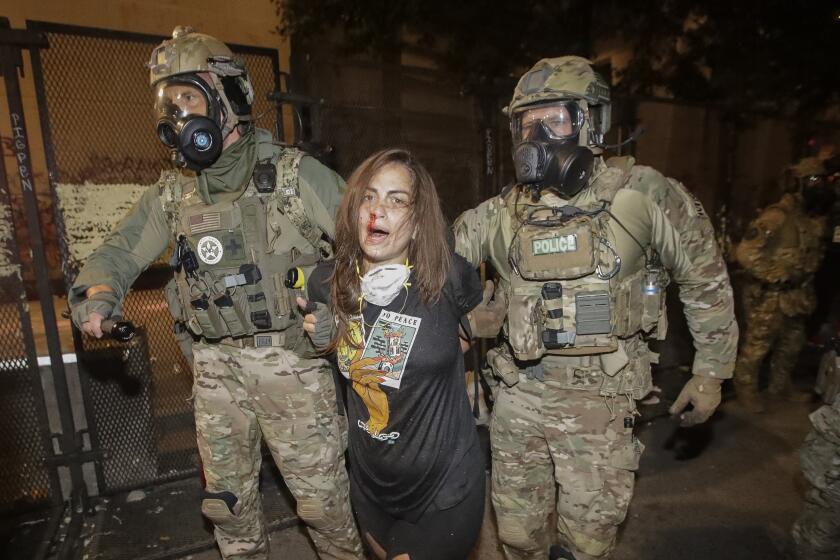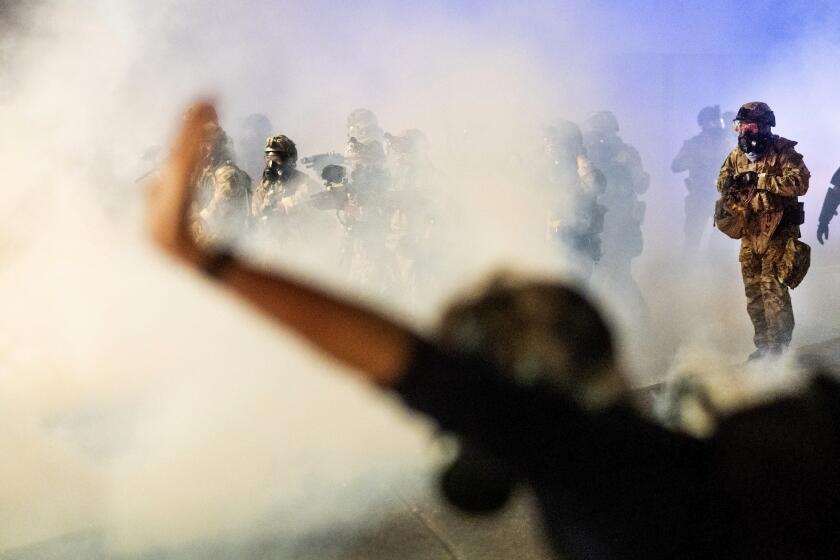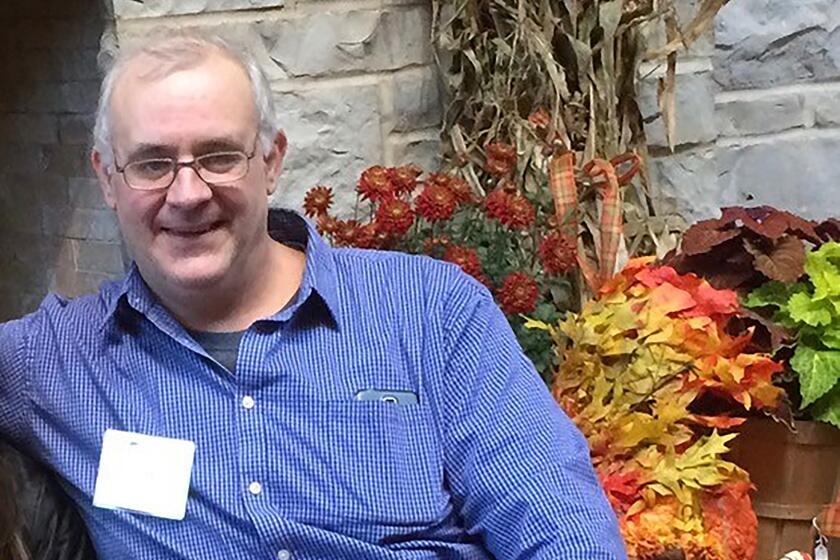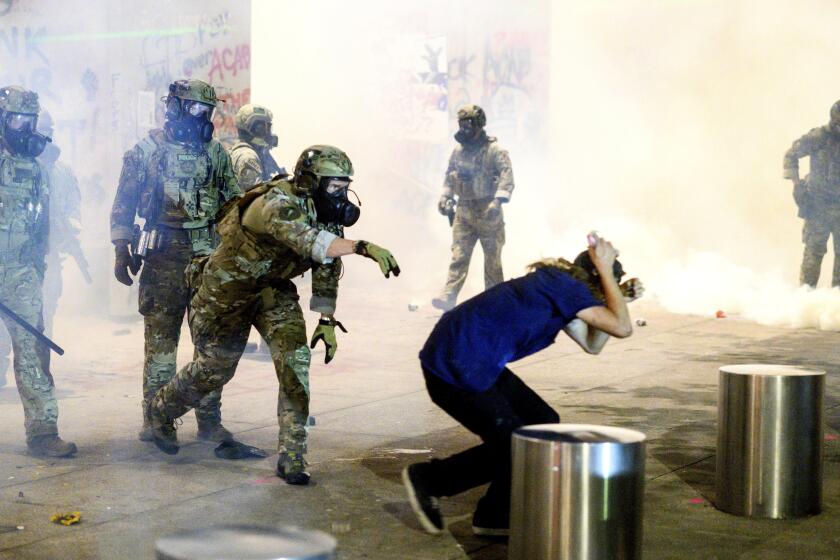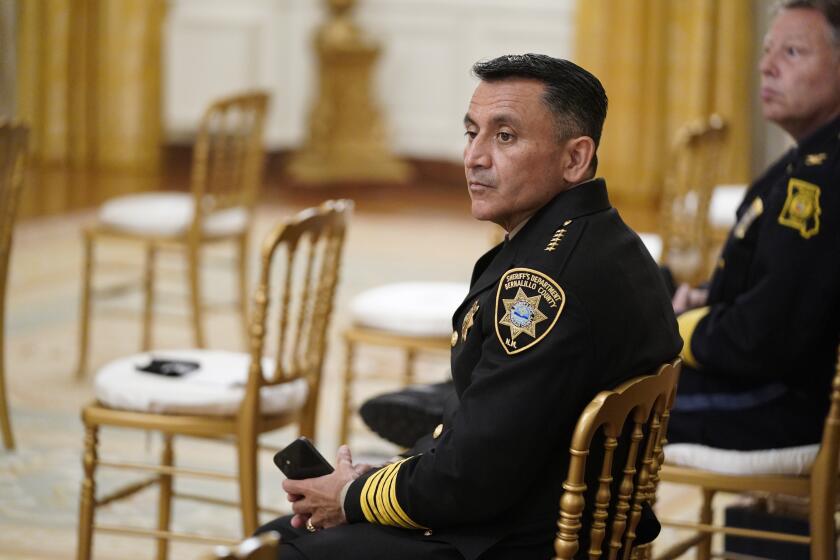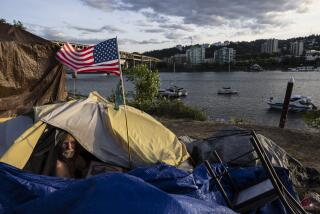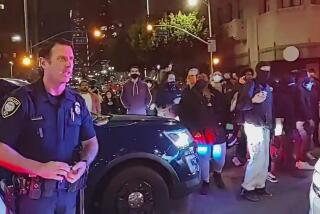Protests reignite across U.S. as standoffs in Portland continue between protesters and federal agents
Federal agents and protesters continued their standoff in the streets of Portland, Ore., over the weekend, a confrontation that has ignited protests in other major cities across the country.
PORTLAND, Ore. — As tear-gas-tinged standoffs in downtown Portland between protesters and federal agents continued over the weekend, a string of fresh demonstrations erupted in other major cities from Seattle to Baltimore, with marchers expressing fury at the specter of heavily armed, unidentified federal officers on community streets and ongoing anger at their initial targets — police brutality and racism.
In Portland early Monday, federal agents in camouflage waded blocks beyond the federal courthouse that the Trump administration had said they were there to protect — against the wishes of local and state officials — and pushed back demonstrators who authorities said had breached a fence.
Although fewer people had shown up outside the courthouse than on previous evenings, protesters noted a more united front, which centered on amplifying the voices of Black Lives Matter activists in their cause for racial justice and demands for federal officers to leave.
The actions of federal law enforcement officers at protests in Oregon’s largest city are raising the prospect of a constitutional crisis.
“We are not just protesters. We are mothers, we are veterans, we are musicians,” said 38-year-old Alvin Rosales. “Being here reminds me of the humanity that every person out here shares.”
By midnight Sunday night, a few protesters had begun setting off fireworks and throwing bottles toward the federal courthouse, which prompted federal officers to tell protesters over loudspeaker to vacate the area.
As fireworks continued to be set off, a small group of federal agents emerged and stood in front of the federal courthouse about 1:30 a.m. Monday, eye to eye with protesters.
After a few minutes, dozens more agents appeared and started deploying tear gas, flash bangs and rubber bullets. Protesters scattered as federal agents began moving up the block.
The standoff lasted about an hour. As federal agents made their way back to the courthouse, they tossed more tear gas, flash bang grenades and other munitions. As on previous nights, protesters used leaf blowers and hockey sticks to blow the fumes and swat the grenades back toward the agents.
In Seattle, after Washington Gov. Jay Inslee said that a small group of federal agents had been dispatched there, protests broke out in the Capitol Hill area. They began peacefully Saturday but turned tense when unknown assailants set fire to a Starbucks and punched a hole in a Police Department building.
Seattle police, after declaring a riot, deployed tear gas and flash bangs, injuring journalists, lawyers and protesters, witnesses said. Police said that 45 people were arrested and 21 officers sustained minor injuries. The protests continued Sunday.
Demonstrations also broke out in cities including Louisville, Ky., Chicago, Los Angeles, Richmond, Va., and Austin, Texas, where a protest took a fatal turn.
Austin police said they were investigating a shooting death on Saturday evening of a man taking part in a Black Lives Matter protest downtown. Police said the slain man, who was apparently armed with a rifle, was shot from inside a vehicle that drove close to the demonstrators. A suspect was detained, police spokeswoman Katrina Ratcliff said.
A U.S. judge denied an order sought by Oregon’s top law enforcement officer to stop federal agents from arresting people during nightly protests in Portland.
In Richmond, police said a city dump truck was set on fire Saturday night amid a demonstration that organizers said was intended as a show of solidarity with protesters in Portland. Police tweeted a photo of items said to have been thrown at officers, including rocks and batteries. Six arrests were made.
And in Baltimore, a police union building was spray-painted with anti-police messages late Saturday as dozens of people marched against racial injustice and in support of the Portland protesters.
The reignited protests — and the response of authorities with tear gas and rubber bullets — are the latest incendiary strain on a country still shaken by the May death of George Floyd at the hands of Minneapolis police and by generations of police brutality. After protests slowed down considerably in most cities — except Portland, where they had continued unabated — they reenergized over the weekend in the wake of President Trump’s move to send federal agents into cities in a strategy that critics said appeared aimed at trying to shore up his flagging popularity ahead of the November election.
As Trump tweets all-caps messages about law and order, critics charge that the White House is making use of chaotic images of confrontations on the streets of Portland and elsewhere to whip up fears about a generalized breakdown of order — mainly in progressive, Democratic-run cities.
The deployment, meanwhile, has instigated a new round of anger that centers on constitutional questions over federal authority and states’ rights. And it plays out amid a pandemic that is battering the economy and sending jobless rates spiraling upward. In some respects, it is reminiscent of the late 1960s, a time of gathering fury and frustration against the White House over the Vietnam War, civil rights and a sense of America drifting further from its ideals and vision of itself.
A 53-year-old Navy veteran was beaten with a baton swung with both hands by a federal officer during protests in Portland, Ore.
It has also left some protesters concerned that their initial message of civil justice for the Black community has become overshadowed by confrontations between federal agents and protesters opposed to their presence.
“I’m out here to see specific legislative changes, like education and justice reform,” said Alaysia Atkins, 24, a Black activist in Portland.
The White House chief of staff, Mark Meadows, on Sunday echoed Trump’s insistence that a federal presence was needed to restore order in the city.
“They’re throwing Molotov cocktails and doing all kinds of rioting there in Portland around a courthouse that they desire to burn down,” he said on ABC’s “This Week,” adding: “I mean, we can’t have this in American cities.”
Meadows also said the riot-control aspect in Portland was different from the dispatch of federal agents to Chicago and elsewhere.
Federal agents can protect federal buildings, but don’t have the authority to police the streets.
“In Chicago, in New Mexico and in Kansas and other areas … what we’re trying to do there is come in and help with gang violence and making sure that we make arrests,” he said.
Chicago Mayor Lori Lightfoot, a Democrat, pointed out on CNN’s “State of the Union” that her city, along with many others around the country, had long cooperated with federal agencies including the FBI and the Drug Enforcement Administration in addressing issues including violence.
But she said a Portland-style federal presence was something else entirely.
“I have drawn a very hard line — we will not allow federal troops in our city,” Lightfoot said.
The mayor said she and other city officials “will not tolerate unnamed agents taking people off the street, violating their rights, and holding them in custody. That’s not happening here in Chicago.”
New Mexico Gov. Michelle Lujan Grisham, who at one point threatened litigation over the Trump administration’s plans, also said her administration was willing to work with federal officials — through normal channels of coordinating with local law enforcement.
“If we are cooperatively working to address violent crime and gun violence — absolutely,” she said on ABC. “If we’re going to try to incentivize unrest, then that’s something altogether different.”
Democratic officials in New Mexico are warning federal agents sent in by the Trump administration against using ‘military-style’ tactics.
Lujan Grisham, a Democrat, said the Trump administration had failed to provide promised federal funding to Albuquerque for police and crime interventions, “so the timing of their efforts remains a bit suspect.”
And she expressed outrage over Trump campaign ads incorrectly suggesting that Joe Biden, the presumptive Democratic presidential nominee, supported defunding the police.
“It is really about stoking fear,” she said, adding that the White House was trying to distract attention from its handling of the COVID-19 pandemic and the attendant economic devastation.
Portland city officials, Oregon state officials and Democratic congressmen from Oregon have repeatedly demanded an end to the federal presence in Portland, saying it has served only to exacerbate tensions. But late Friday, a federal judge denied a request by Oregon’s attorney general to restrict the actions of the federal agents.
Etehad reported from Portland, Ore., and King from Washington, D.C.
More to Read
Sign up for Essential California
The most important California stories and recommendations in your inbox every morning.
You may occasionally receive promotional content from the Los Angeles Times.

